Mike Judge Extract
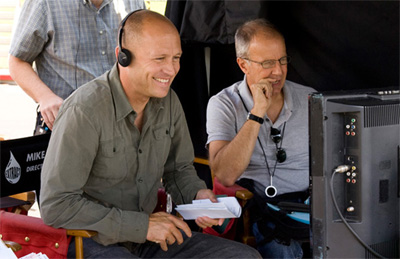
JUDGING MIKE
EXCLUSIVE Mike Judge, Extract Interview by Paul Fischer.Mike Judge has created some of TV's most iconic characters, from the seminal Beavis and Butthead, to Hank Hill in the now cancelled King of the Hill. On the big screen, Judge wrote amnd directed risk-taking films that satirized working-class America, with his groundbreaking Office Space, his critically mixed but largely unseen Idiocracy, and now his latest feature film, Extract, a sublime comedy revolving around a flower extract plant owner deals with workplace issues and a stream of bad luck, including his wife's affair with a gigolo. The writer/director talked to Paul Fischer in this exclusive interview.
QUESTION: It seems that if there is a recurrent theme in your work, whether it's the animated material on television, or your feature films, that you often deal with, I suppose in some ways, the reality of working class America. Is that a theme that has always resonated with you, ever since you began?
MIKE JUDGE: Yeah, probably so and if I felt like I was running out of material, I'd go on to something else. But I just remember, growing up, especially in the '80s, just thinking that people - characters in TV shows and movies just seem to have endless cash, and they don't have to worry about it. I remember when we were little, my sister would read these Nancy Drew books and I'd look at 'em, or she'd tell me about 'em, and they would just say "So, I hopped on a plane." And I'd think, "Well, how'd you buy the ticket? Where's all this money come from?" Then you become an adult, and you got to pay car insurance and all this stuff. I don't know. I guess that stuff seemed kind of neglected, maybe, and that's why I'm drawn to it.
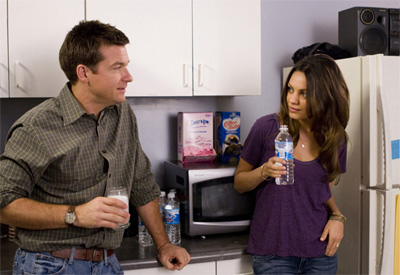 QUESTION: Is Extract, in some ways, one of your more personal comedies?
QUESTION: Is Extract, in some ways, one of your more personal comedies?MIKE JUDGE: I'd say probably not as personal as Office Space was, maybe, but a little bit. I mean, a lot of the stuff is pretty crazy - like, with the gigolo, and all that. But, I mean that came out of a conversation that I was having with a couple friends about ten years ago and just kind of thought, "What if, through some crazy logic and probably being drunk or on something, somebody decided that that was a good idea, and then couldn't stop it?" So it's not like that ever happened [LAUGHTER] to me. But in a way, the part that's kind of autobiographical to me, I guess - Office Space was from the point of view of the employees, and sympathetic to the employees and I've had a bunch of jobs. Beavis and Butthead didn't happen until I was pushing 30, and suddenly I had anywhere from 30 to 90 people working for me, after having never had anybody work for me. I would just sit there and go, "God, these people don't appreciate anything," then realized that I was kind of becoming sympathetic to my old bosses. So, I wanted to do something that was from the point of view of the boss and just seeing how - when you try to be a nice boss, you get taken advantage of, and that didn't work. Just that kind of dynamic, I thought would be funny.
QUESTION: When you write for television, it's obviously a whole different discipline to writing feature films, so how disciplined a screenwriter are you?
MIKE JUDGE: I'm not disciplined enough. I tend to write in spurts, and goof around and pace around. It helps when I have a deadline. With this one , I ended up having a deadline when we were going to shoot it, for the rewrite, but I can be disciplined and on TV, you have no choice. I hate to say it, but it kind of helps to have a deadline, because I don't like deadlines, but it does help me write. I'm not real disciplined that way.
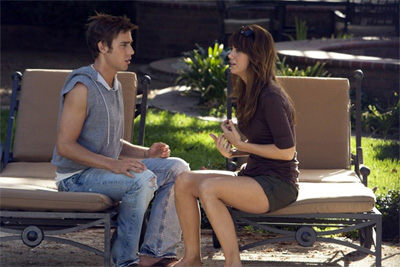 QUESTION: Was this a difficult script for you to hone, to structure, and to find, for you, the narrative through-line that you need to develop a script like Extract?
QUESTION: Was this a difficult script for you to hone, to structure, and to find, for you, the narrative through-line that you need to develop a script like Extract?MIKE JUDGE: Yeah. That part of it, I guess the narrative part of it was difficult, because I was weaving together three different stories. But then again, that part of it - that's the kind of difficult that I like. That's kind of like solving puzzles. And that part of it, I like. And I actually liked writing - I think the best dialogue that I write comes really quickly, and then I end up not changing it much at all. And then there's other dialogue that - it seems like it's one way or the other. It's either stuff that comes really quickly, or takes a really long time to try to get it right. And then the narrative part of it is probably the trickiest. But when I say "difficult" or "tricky," I don't mean it in a bad way. I actually like it because of its problem-solving, puzzle-solving exercise that I kind of like.
QUESTION: Do audiences or studio people have specific expectations of you, given your background? Is it difficult for you to live up to those expectations?
MIKE JUDGE: Well, this one we did with private investors, and then Miramax came in with - I think three of the $8 million of the budget. I'm not sure if I have that number right. And bought domestic distribution. So, it wasn't a full-on studio experience, the way it usually is, but I try not to think about that. I mean, you think about each movie, or each TV project, just on its own and it's weird as much from the outside, the way the the entertainment media look at it, it's almost like a sporting event, you know? What place the movie came in, and all that stuff. I don't remember it being like that when I was a kid, but maybe I just wasn't paying attention to it. But on the inside, you want everything to do well, but it's not like you're going, "Okay, if I change this, it'll make $2 million more at the box office," or something like that. Because nobody really knows, you know? And it seems like any time anybody's talking about what's commercial and what's not, it's not very - there's not a very good accuracy rate on that, you know? I think people tend to forget all the expensive movies that were supposed to be commercial and failed, and they tend to forget ones that were successful, how they didn't think they were going to be commercial, and so on. So, I don't know. It doesn't feel like that kind of - "We're expecting a big hit." Especially something like this, that we made for pretty low budget.
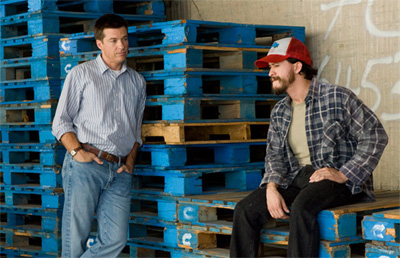 QUESTION: Now, after 12 years, why was it the right time for you to put King of the Hill to bed?
QUESTION: Now, after 12 years, why was it the right time for you to put King of the Hill to bed?MIKE JUDGE: Well, Fox cancelled it, but I think it's a good time to put it down. I think it feels like if we kept going, we would run the risk of running it into the ground and I don't want to do that. I feel like - five or six years ago - maybe it was longer - when John Altschuler and Dave Krinsky started running it - I guess it was 2001 or 2002, I was going to quit a couple times back then. I wanted to stop. And I used to say that - "Okay, I'll have one bad season. I have one bad season in me. I can be okay, it's been on so long, and I think so solid, and such a good show that I'm proud of, that if there were one bad season, I'd be okay with it." I'd like to think we never had that bad season, so, I'm kind of glad to be able to stop without having a miserable season as the last season. It's been a long run. I mean, 13 years, it's the second longest-running animated show in history. Although once we stop, I think South Park only has to do one more year, and then they lap us.
QUESTION: Did you have a huge hand in the finale?
MIKE JUDGE: Well, what happened was, we wrote the finale when it was cancelled the first time - like, three or four years ago. And it really was cancelled. I mean, we cleaned out our offices everything was done, everybody went on to other jobs, and then it came back, because animation, you're working so far ahead of it. I really thought that was a great finale and a great way to go out. Then the show came back, and then we had to make that episode not seem so final [LAUGHTER] and do all these little trims to it, and stuff. So this time, what they're calling the finale are just the last two episodes of the season, when we didn't know it was over, or weren't sure it was over. So, they're just kind of two episodes. Which - in a way, maybe that's not a bad way for it to end, so, whatever I went through about it being over, and thinking about the last episode, that already happened.
 QUESTION: Does the politics of television get any easier to navigate? I mean, I know that The Goode Family, for example, was on ABC for a short while, and may go to another network but, do you get very philosophical and circumspect about TV the more you've worked in it?
QUESTION: Does the politics of television get any easier to navigate? I mean, I know that The Goode Family, for example, was on ABC for a short while, and may go to another network but, do you get very philosophical and circumspect about TV the more you've worked in it?MIKE JUDGE: Yeah. It doesn't seem to get easier to navigate. I remember Matt Groening, when he was getting Futurama up and running, saying it's just like some first-timer coming in, the way they were talking to him and on Goode Family, I really didn't have to deal with it, because that was really John Altschuler running that, and that was kind of his idea, that show. I'm one of three creators on it, and I didn't have to really deal with the network that much on it. I was busy with this, anyway. But - yeah. I mean, I did a pilot for Fox back in 2001, and I didn't want to do it again any time soon. I guess it doesn't get easier. The actual shows - King of the Hill, got easier, once the show's a hit.
QUESTION: Would you focus on film now? Or do you plan to go back to television?
MIKE JUDGE: I'm not sure. I really like television. It's in a weird place right now, but sometimes when it's in a weird place, it's a good time to try something really radically different. I don't have any plans right off the bat. There's a movie that John and Dave, my partners in this, wrote. It's called Brigadier Gerard. It's based on the Sir Arthur Conan Doyle stories that he wrote during the Napoleonic wars, and they're just really funny, these stories. It's almost like a Clouseau character. And John and Dave wrote a really great screenplay based on these, and I think that may happen in the next year or so. And I'd probably produce it. I don't think I'd direct it.
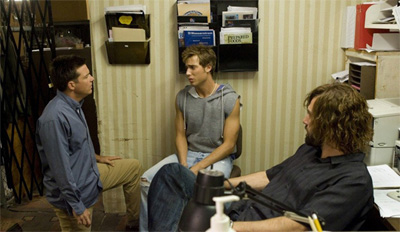 QUESTION: Would you rather direct stuff you write yourself?
QUESTION: Would you rather direct stuff you write yourself?MIKE JUDGE: I guess so, but then - yeah. I mean, I like the writing process, the editing process, and I like it when it's over. So, I think partly it's just because I like writing. But, I mean, I would direct something that I didn't write. It hasn't happened yet, but I've thought about it. Yeah.
QUESTION: Has there been any pressure on you to bring back Beavis and Butthead? I mean, they were such iconic characters for you. Do you think we'll ever see them again?
MIKE JUDGE: Well, there's been a lot of talk about that lately. It seems to come up - I don't know, every three years, or something. And - yeah. I mean, I've done little things with them, kind of under the radar here and there. But it's just a lot of - there's no way around it being a lot of work for me. I mean, it would probably take 2 ½ years of me doing nothing else for that to realistically happen. And that's rushing through it. Even though the first one, we did insanely fast and it almost killed me - I mean, we did that in a year, basically. And for an animated movie, that's just crazy. So, I don't know. sometimes I wish I could just be like Stan Lee, and sit back and watch people make huge Spider-Man movies and stuff. But that's not how it works. I don't know. I like to keep the door open on that. Because it's the thing I'm most proud of, I think, that I've done. It's my favorite thing. I don't know if I'll ever do anything that funny and unique again, and I wouldn't mind doing something with it again.
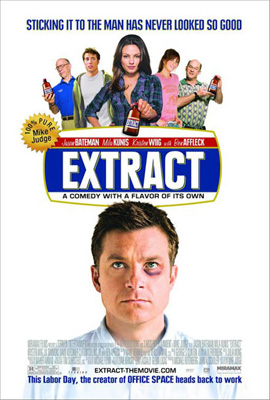
Extract
Starring: Jason Bateman, Mila Kunis, Kristen Wiig, J.K. Simmons, David Koechner, Clifton Collins, Gene Simmons, Ben Affleck, Beth GrantDirector: Mike Judge
Genre: Comedies
OFFICE SPACEs Mike Judge directs this comedy that is bursting with talent, from JUNO stars Jason Bateman and J.K. Simmons to SATURDAY NIGHT LIVEs Kristin Wiig and FORGETTING SARAH MARSHALLs Mila Kunis. Bateman stars as a man who is anxious to sell his business, but his plans are threatened by a strange, unexpected event. EXTRACTs diverse cast also includes David Koechner, Clifton Collins Jr., Gene Simmons, and Ben Affleck.
MORE
- Viggo Mortensen The Road
- 24 Cast Reunion
- Aaron Eckhardt No Reservations
- Aaron Eckhart The Dark Knight
- Adam McKay Step Brothers Interview
- Alan Alda Diminished Capacity Interview
- Alan Alda Diminished Capacity Interview
- Alex Dimitriades
- Al Pacino Oceans 13
- Alan Rickman Snow Cake
- Alan Rickman Sweeney Todd



